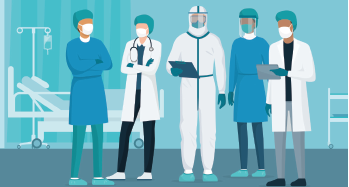Clinical Scenario
You’re an otolaryngology faculty member at an academic medical center. You have clinical responsibilities for a range of patient care sites, you have teaching responsibilities for residents and medical students, and you are working to establish a credible research effort. All of your efforts have been going well, with a high level of personal and professional satisfaction. Then along came the novel coronavirus—COVID-19.
Explore This Issue
May 2020At first the incidence of infected persons in the population seemed low, and there was hope for a lesser impact in the U.S. than in China. As the numbers of infected persons rose, however, so did the number who required hospital admission, in particular to intensive care units. Having some understanding of public health, you knew that the number of counted infected persons lags behind the actual incidence in the population, especially with a virus that has a high transmission potential and varying levels of symptoms and signs.

© elenabsl / shutterstock.com
Now it’s clear that the virus is catching hold across the country through traveler and community spread. Following federal guidelines, your state has finally placed a moratorium on all surgeries and procedures that aren’t immediately medically necessary. Evidence that upper aerodigestive tract endoscopic procedures are among the highest risk for surgeons is emerging. There is information that healthcare personnel in your hospital system are increasingly turning up positive for COVID-19, with the concern that others may follow. You have been asked to continue to care for patients with urgent and emergent issues in both outpatient and inpatient settings, amid rumors that personal protective equipment (PPE) supplies are running short and should be conserved and/or reused. At this time, critical care specialists are providing the frontline care of seriously ill patients, and other physicians may be tasked to provide critical care as the demand increases. You have also heard that some community private practitioners continue to see patients, while others are significantly restricting their practices. You are quite concerned about the resident cadre and medical student exposure risk.
How can you navigate the ethical challenges and personal risks with your sworn obligations to patients?
Discussion
Note: This discussion was written during a specific point in time, and, most assuredly by press time, the clinical situation will have dramatically evolved, hopefully in a positive direction. The comments below are specific to challenges U.S. otolaryngologists face during the COVID-19 epidemic.
Most certainly, the challenges/pressures placed on practicing otolaryngologists by the COVID-19 pandemic are not really “everyday ethics.” Very few situations test our commitments to ethical principles more than a pandemic that requires so much from us for the greater social good.
However, it is during these times that we come to understand the importance of making clinical and personal decisions based on the four ethical principles that so firmly guide our “normal” practices—beneficence, non-maleficence, autonomy, and social justice. Several of these principles are frequently in conflict, but in the midst of COVID-19, these ethical conflicts may become even more challenging.
Most American otolaryngologists don’t have clinical experience with outbreaks or epidemics. Some older otolaryngologists (like me) do remember the polio epidemic in the late 1940s and early 1950s (as children and teens, not as physicians), but these memories are sufficiently strong to help us appreciate the dangers of the current COVID-19 epidemic. While polio was primarily an intestinal infection, saliva and respiratory droplets were a secondary transmission mode. COVID-19 has a high upper respiratory tract transmission mode, causing otolaryngologists to be among specialists with the highest clinical risk.
Infectious disease outbreaks, epidemics, and pandemics may well represent the most ethically challenging clinical responses for all physicians. In a general sense, our ethical challenges during this pandemic will fall into four categories: duty to patients and society; duty to the profession, including colleagues, trainees, and staff; duty to family and friends; and duty to law and order.